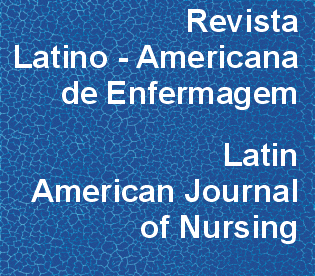Importancia de la comunicación en los cuidados paliativos en oncología pediátrica: un enfoque en la Teoría Humanística de Enfermería
DOI:
https://doi.org/10.1590/S0104-11692013000300018Resumen
OBJETIVO: investigar y analizar la comunicación en los cuidados paliativos en oncología pediátrica, bajo el punto de vista de los enfermeros, con base en la Teoría Humanística de Enfermería. MÉTODO: se trata de una investigación de campo, con abordaje cualitativo, de la cual participaron diez enfermeros actuantes en oncología pediátrica en un hospital público brasileño. Para la recolección de los datos, fue utilizada la técnica de entrevista semiestructurada. Las declaraciones fueron analizadas cualitativamente, bajo el marco de la Teoría Humanística de Enfermería, y de las cinco fases de la Enfermería Fenomenológica. RESULTADOS: del análisis del material empírico del estudio, surgieron dos categorías temáticas: "estrategia para humanizar el cuidar en enfermería, con énfasis en el alivio del sufrimiento del niño", y "estrategia para fortalecer el vínculo de confianza entre el enfermero y el niño". CONCLUSÍON: la comunicación se configura como un elemento eficaz del cuidado en el niño con cáncer y es de suma importancia para la promoción de los cuidados paliativos cuando fundamentada en la Teoría Humanística de Enfermería.Descargas
Los datos de descarga aún no están disponibles.
Descargas
Publicado
2013-06-01
Número
Sección
Artículos Originales
Licencia
Los derechos de autor son propiedad exclusiva de la Revista Latino-Americana de Enfermagem (RLAE), transferidos a través de la Declaración de Transferencia de Derechos de autor (que está en el formulario individual de declaración) firmada por los autores. Para el uso de artículos, RLAE adopta la Licencia Creative Commons CC BY-NC atribución no comercial (abstracto o código completo de licencia). Con esta licencia es permitido acceder, descargar (download), copiar, imprimir, compartir, reutilizar y distribuir los artículos, desde que para uso no comercial y con citación de la fuente, dando los créditos de autor a la Revista Latino-Americana de Enfermagem. En tales casos, no se necesita permiso de los autores o editores.Cómo citar
França, J. R. F. de S., Costa, S. F. G. da, Lopes, M. E. L., Nóbrega, M. M. L. da, & França, I. S. X. de. (2013). Importancia de la comunicación en los cuidados paliativos en oncología pediátrica: un enfoque en la Teoría Humanística de Enfermería . Revista Latino-Americana De Enfermagem, 21(3), 780-786. https://doi.org/10.1590/S0104-11692013000300018



